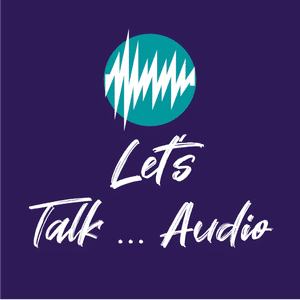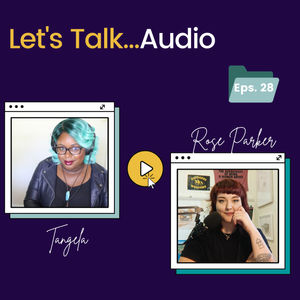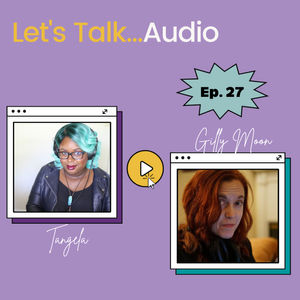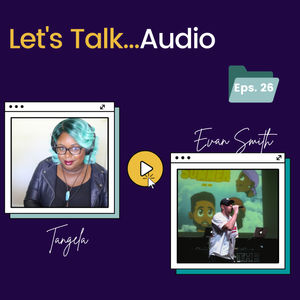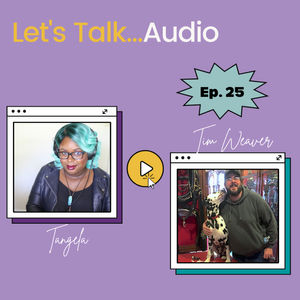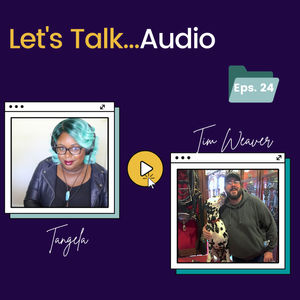Recent Episodes
Hello World! Welcome back to Let's Talk...Audio. Remember to join us on Discord!
Rose was one of the first people to start following Tangela on IG when the podcast launched in early 2020. Tangela always wanted to visit Brisbane. Rose brings up an animated kids show that is entirely produced in Brisbane, called Bluey.
Tangela shares her love for childrens' shows' theme songs as well as jingles in general. Tangela asks Rose about a favorite theme song. Rose's first thoughts are of the THX film intro and the Playstation 1 boot up sounds.
Tangela's favorite theme song (at the time of recording) was for the TV show Psych, partly because there were alternate recordings of it depending on episode context, including Boyz II Men and Bollywood versions.
After discussing music in a similar light, they talk about front-of-house work and Tangela asks Rose about her work streaming live shows to the internet. That discussion includes running front-of-house with limited setups, such as fewer microphones than the band would have ideally.
Rose - "live is the thing that made me realize that even if I screw up, it's gonna be alright ... and you can be annoyed about it, but the gig's done now"
She points out that she is constantly reinforcing to her students that they should share their work, in process. It doesn't have to be perfect before they show anyone (and shouldn't, at least if you want constructive criticism and feedback).
Speaking of students, Rose is a lecturer at a university. As a teacher-person, she's been teaching for 8 years this year. She originally went to school herself for a Bachelor's in Audio. Rose tries to keep up with changes in technology with regards to audio. She cites TikTok as a particularly powerful case study regarding impact on the music industry. FMOD is an audio middle-ware (between your game engine and your DAW) tool she's been particularly excited about. It is used to manage the audio library in the context of interactive media like games.
Rose - "It allows you to just create all of this diversity from a quite small package of original sounds ... you get to choose how it will actually play back in a much more detailed kind of way"
Next they discuss how and why Rose has segued into gaming audio. As part of the topic, she uses Red Dead Redemption 2 as an example for dynamic and flexible sound scoring/design. From there they discuss the nuances around creating audio for use in consumer grade speakers/headphones, as well as the compression challenges associated with streaming platforms.
After, they discuss demographics in fine detail, in terms of inequalities and the differences between America and Australia. They also discuss whether or not there is a labor shortage in audio. Tangela refers here to the Tim Weaver episode. Rose relates to Tangela how the festival economy has been seriously affected by Australia's state level border closings during Covid.
For closing thoughts, Rose strongly recommends that creatives push themselves to make stuff, and release it, put it out! "Not being precious about anything"
Rose can be found at roseparkeraudio on everything.
"Rose had an early interest in music and audio production spurred while flipping through her parents vinyls as a kid and wondering, "How did they get it to sound like that?!". Rose started playing guitar and running the sound production at her school when she was 14 and hasn't stopped working with audio since then. Rose has worked at West End record store, Jet Black Cat Music, liaising with artists & management, providing live sound for in-store shows, as well as recording them for the stores YouTube channel. Rose also works in and around Brisbane as a freelance Audio Engineer on many projects, as well as lecturing in Audio and Cultural Studies at SAE Brisbane. In music, she is mainly focussing on indie productions taking them through the recording, mixing and mastering stages. In post-production she is currently working on a mobile game, creating all audio assets and implementing them via FMOD."
Reminder: LTA has a Discord server!
As usual you can find Tangela on her website where you can sign up for the Newsletter!
Hello World! Welcome back to Let's Talk...Audio. Remember to join us on Discord!
The interview starts off discussing the stereotype of the grumpy sound engineer, and where it might have come from. After some thoughts on stereotypes, they attempted a proper introduction for Gilly Moon. She is an audio engineer and sound designer based in Los Angeles, CA. She holds her MFA in Sound Design from California Institute of the Arts, where she did sound design for theater, themed entertainment, film, animation and spatial audio. After graduating in 2016, her wide range of interests led her to doing a lot of work for themed entertainment attractions, such as Halloween Horror Nights and San Diego Comic Con. In 2018, Gilly and her co-sound designer won an Ovation Award for Excellence in Sound Design for Rogue Artist Ensemble's "Kaidan: Walls Grow Thin," an immersive Japanese horror production that spanned three floors of a warehouse. Gilly currently works as a Broadcast recording Technician for NPR.
Tangela asks Gilly about the general advice in the industry about niching down.
"I find that there are a good number of people that do not do that, and you are one of them! ... Was that on purpose? ... How'd that come to be?"
After some discussion about each of their academic and career histories, they concluded that while a person's career can seem to lack a defined niche, oftentimes there's a common thread that ties things together.
Tangela asks Gilly how she developed an interest in audio. That sparked an involved discussion about both their backgrounds in theater. From there they move on to a discussion about resources for training your ear to be a better audio engineer.
Gilly says she really enjoyed listening to these past episodes.
After discussing podcast format, Tangela makes the case that the podcast industry still has a lot of growing room in comparison to other industries like cinema and gaming.
From there they spend some time discussing the accessibility of recording and the different pros and cons of Apple products.
Gilly wrote a blog post for Sound Girls a while ago about language and biases in audio that Tangela wanted to dig into.
They cover a variety of specific examples of biased language before getting around to the question of, is there "an end point to trying to transform the audio world ... without it just turning into ... a clutter bucket of tomfoolery ... ?"
Gilly explains the point of Diversity Equity and Inclusion initiatives, concluding with "I don't think there's an end goal, I think we're always gonna be looking at our group and being like, 'what does it look like right now, ok how can I make it better?' And I think that's kinda fun."
Tangela wonders what diversity means outside of metropolitan areas. After riffing on that, they tackle the idea of "minorities are expected to take on the work of diversifying a predominantly white place often," in Gilly's words.
Tangela points out to Gilly that a lot of her questions are meant to be open ended and don't necessitate an answer in this moment. The point of the her questions tends to be "are we thinking about it? ... if we don't have an answer, why don't we have an answer, and why haven't we thought about it?"
Tangela: "I think there is a time and a place for everything, and sometimes it is neither the time nor the place nor the person ... You gotta find the right people to ask, you gotta find the right time to ask them."
Gilly's closing thought is a reflection on her early experiences in audio. "If anyone's in a place right now that they're not being talked to the right way, don't pick up that habit and keep it going. We all tend to take lessons and run with them and say 'o this is how I was treated' ... the way we talk to each other sometimes in production is not the way we have to talk to each other."
This episode was recorded on February 9 through Squadcast.fm.
Gilly can be found at
IG @gillymakessound
Twitter @takewing14
Reminder: LTA has a Discord server!
As usual you can find Tangela on her website where you can sign up for the Newsletter!
Hello World! Welcome back to Let's Talk...Audio. Remember to join us on Discord!
Evan Smith wears many hats. He's a DJ, an audio repair tech, a producer, and an evangelist. He went to school at MediaTech Institute in Dallas, TX, to learn audio.Tangela points out in the opening statements of the show that, while Let's Talk...Audio is about minorities in the industry, she views that umbrella as including things outside of the usual talk about identity. For instance, outside of the church, it is abnormal to find audio engineers who profess a Christian perspective.
Evan says "I've seen God work more outside the church, than inside."
Tangela: "I don't typically see audio engineers who are as forward with their faith ... I think that's something ... that would be nice for people to hear about ... to know that if that's something that matters to you, you can do it and be successful in it."
Evan also works under the name DJ Evon. He uses the request for an introduction to talk about how he presents his Christian perspective in the context of his work.
Evan does front-of-house sound for his church. He is also in training for audio repair with Audio Electronics in Dallas.
They spend some time talking about the joy of watching musical artists become successful, and being able to remember the tiny local gigs they used to play.
Tangela: "How do you maintain that balance of being in the secular world ... with your beliefs ... that are at the forefront of your business model?"
Evan: "We're not called to judge people outside the church; we are called to judge people inside the church ... what we need to do is stop, take a breathe ..."
Tangela asks if he gets push-back against his desire to play clean music when he DJ's shows. Evan says most of his clients respect his preferences and roll with it.
Tangela finds a need to clarify for her guest that, while Audio is in the title, it's meant as a starting place, rather than an end goal for interviews. This show is more about how do people function in the world of audio. Tangela points out that there may be members of the audience who follow Jesus, or there might be members of the audience who struggle with sobriety. So she sees this talk as an opportunity for discussing how to handle situations of excess when what you need is restraint.
Tangela expresses a takeaway from Evan's thoughts. "You're talking about setting healthy boundaries with people ... being up front with [expectations]." So how do you set up healthy boundaries? It's one thing to say, you should have healthy boundaries. It's another thing to grow and develop healthy boundaries.
Evan points out that having deliberate and consistent communication with trusted friends is a key strategy for keeping yourself accountable. He shifts to talking about maintaining rules in a studio situation. "Also, 9 out of 10 audio repairs are because of food ... so don't bring stuff into your studio ..."
From there they talk about sound treating your work space with sound panels and bass traps.
And then the gear talk starts, and "O my gosh, Evan just went to his closet ..."
Evan shares an array of microphones he likes to use, and we find out he is a fan of Slate Digital. Evan takes another opportunity to praise the MediaTech Institute. This podcast interview is being recorded (on his end) with an Universal Audio Apollo X4 interface. His headphones are the Slate VSX.
Tangela: "Would you say that you make the gear, or does the gear make you?" She wants to know what Evan's overarching philosophy about the relationship with gear.
He says that he started out believing that he needed the best gear, and that over time he realized it doesn't matter, and the important thing is do your best work and to serve people. He hypes MediaTech all the time because that place helped him to see what he is capable of doing himself.
Tangela: "What was ... the hardest ... thing that you had to learn in terms of managing your business or ... starting out in audio and trying to make that your primary source of income?"
Evan: "Never pass up a hundred dollars ... I'm serious! I heard this once and it brought gratefulness, God is gonna provide for you and a lot of people don't have faith ... If God is telling you to do something, do it ..."
"The music industry is like stocks ... there's high points, there's low points, and you keep going ..."
"Making a plan, having a budget, is super important; that's what I'm learning now ..."
Evan has learned to "care a lot more about the people and the relationships than just making music or being the 'next big thing' or whatever. I think our eyes need to be towards who are we doing this for."
Tangela translates: "Remember your purpose, and not just being out here because you wanna be out here in these streets."
One of the next topics that comes up is the meta issue of clarifying techniques in conversation and interviews. Evan doesn't skip a beat and recommends MediaTech to Tangela.
Evan: "What I am saying is that they have resources for the public to use."
Tangela: "Do you think that's a big lesson through your life ... learning to say Yes to opportunities?"
Evan: "Yes ..."
Tangela: "The first time I went to college I went to Dallas Baptist University ... DBU's music business program had a huge focus on learning business and understanding business ... How did you learn how to run and manage your business?"
Evan says he learned some in school but also a lot through practice, through doing. He emphasizes networking as a major component of success in business.
Tangela asks about systems in Evan's business for keeping organized. She brings up examples like spreadsheets and CRMs (Customer Relations Management). Evan talks about data integrity choices he makes with his computer.
Tangela: "What is a business skill you're trying to learn right now?"
Evan: "Time management ... It's really about having genuine time with people ... There's a lot of projects that I'm working on ..." Evan keeps very strong and detailed calendars.
Evan was cooped up at home during the lockdowns last year, but was able to buy a house while the markets were in a slump before things got crazy. Otherwise the covid situation has been a big pivoting opportunity.
Tangela: "Evan! What are you racially? ... I try to have some tact but I have none of that right now!"
Evan is second generation Italian-American. He goes to visit family in Italy regularly. By American standards he's "white", but doesn't look stereotypically white.
Evan: "Keep this, I love this by the way. I want everybody to know about this conversation."
Tangela: "I don't edit my own podcast," because she's too hard on herself about content edits. "Mostly I'm a one-person-show, except" for the cutting out edits and the show notes.
Evan also does podcast editing.
Tangela: "Do you not think it's important to niche down?"
Evan: "That's a very good question, I don't think so; If you limit yourself, you never know what you're capable of doing."
Tangela: "The fundamentals of sound are the same everywhere ... but how you do audio in live sound vs podcasting vs music ... they're not the same ... the way you approach them is different because the mediums are different ..."
Tangela points out that there are downsides to being too open, in terms of the quality that can be achieved in any one area. Evan agrees and also points to scheduling issues.
Evan: "I'm a DJ at heart ... that's what I love to do and that's my passion."
Tangela: "A lot of people view DJing as a performance job, and maybe audio engineering is a behind-the-scenes performance ... As sound engineers we effect how people here the sound ... [a sound engineer] is part of the artist's performance ... I can understand how you would have learned all of it together and see it as all one thing."
Evan: "I learned all of it together ... I gravitated towards live and studio work."
Tangela: "I never had anybody put them in the same category before ..."
"What is some advice that you'd like to leave the audience?"
Evan: "Never give up ... "
This interview was conducted over squadcast.fm on July 24, 2021. You can find Evan at www.djevon.com
Reminder: LTA has a Discord server!
As usual you can find Tangela on her website where you can sign up for the Newsletter!
Hello World! Welcome back to Let's Talk...Audio. Remember to join us on Discord!
This is part two of the Tim Weaver interview! Picking back up, Tim says he has been seeing fewer new-to-audio people over recent years showing interest in getting into live sound work. He gives some advice about work ethic for starting out. He also tells us about the equipment available in the cowboy church where he works (and where he signed into the interview from).At this point he drops a thesis that will be a theme throughout this episode. In live sound, ultimate audio quality is a myth, Good Enough is good enough!
He used a two channel Focusrite interface with an Audio-Technica 4040 on his end of the interview.
Tim gets back to the topic of work ethic.
Tim - "the number one thing that will keep them calling you is reliability ... being there, being reliable, being someone they can count on for all things, means they will count on you for all things. When it happens, they're gonna have an event show up and the sound guy's gonna be booked somewhere else, and they're gonna give it to you."
"Be careful cause you can get abused in that situation ... you have to audition the company you want to work for."
Tim claims there's a labor vacuum in the production economy for live events. Also, does anyone remember Kinko's?
Tangela pointed out to me (Jeff, the editor and shownotes writer, Hi!) that she had a title for the episode in mind.
Tim says he gets weekly calls from venues looking for sound engineers to run live sound.
"There are gigs out there and not enough sound guys to go do them ... Part of that is because this industry ... on this level ... the hours are terrible and the pay is low."
Tim ended up starting his own sound company in 2008-2009. He ran it for a few years. "I wasn't very good at it. If I had another piece of advice for anybody ... take business classes ... because that will ... teach you about taxes, teach you about pricing yourself, teach you about total costs involved in doing what you do, and those were all the things I was missing in my business."
Tangela says she's been thinking about "entrepreneurship versus nine-to-five mentality. And right now ... the world in general is just like 'start a business!' and nobody really talks about, one, how hard that world is ... and then secondly ... that being nine-to-five is OK for certain types of people!"
Tim says his FoH guy in the church, Matt is a corporate AV guy in a tower in downtown Houston for his day job through the week, plus he does a couple additional night gigs on the weekend.
Next, Tangela gets Tim to explain the story about how he hired Chance Sampson (which is how she got acquainted with him later). It involved a truck with a trailer full of gear and cash waiting for Chance to show up, sight unseen, having only spoken to Tim over the phone previously!
Tim points out he's old, and grew up rural, so that's his background mindset. Further, "I've been pleasantly surprised, way more than I've been screwed over. And I think part of that, is because I'm placing my trust in a person, and that person is responsible for their own stature in life at that point."
Tim relates another story about a mediocre lighting tech he took on tour once.
Afterwards he talks about the presence of adversity in live production, and how that issue has decreased over the years. The digital technology advances have decreased the workload significantly. The consoles are lighter. Connectivity options like Dante, wifi, and bluetooth have decreased the need for mic snakes, etc.
Tim relates a couple of different stories of getting yelled at in tense situations by members of bands he was working for.
They move on to a discussion about networking. How does the popular media's emphasis on networking differ from the work of building a strong network?
Tangela asks Tim, "what does XLR stand for?" because apparently he asked her that question one time, because he didn't know. So Tangela went and found out.
Shortly thereafter, Tim rants about Apple products and their lack of connectivity options.
Tim points out there are lots of areas of opportunity in the pro-audio software space. He prefers Behringer consoles over others because the user interfaces are better. He relates a story about running FoH for a symphony with a director who has an impeccable ear.
This story is used to support his point that "ultimate highest quality ... doesn't really matter at all. Good enough is good enough. Get there ... learn how to get to good enough really quickly and do it on a consistent basis. And then you can spend the rest of the night tweaking out to get it as high fidelity as you can handle. Just be aware that ... you can tweak yourself into a whole. Unfortunately the only way to learn how to not do that is experience ... Sometimes I have to just stop, and A B what I did vs no EQ on that channel."
Tim Weaver is going on 30 years in the production business. "I still love it, even if my back doesn't!"
In the preshow questionnaire Tangela asked him if there are any current projects he's excited about. "About once a month I mix a group of old timers doing western swing music. There are some grammy winners in the band. I absolutely love it."
Reminder: LTA has a Discord server!
As usual you can find Tangela on her website where you can sign up for the Newsletter!
Hello World! Welcome back to Let's Talk...Audio. Remember to join us on Discord!
This interview kicks off with a story from Tim about some western swing shows he worked in Vegas. Tim Weaver has been working in live audio production since 1993. Tim says he started using digital consoles regularly about 2000. He also says that audio quality for a live event doesn't have to be perfect. "Good enough" is the goal to aim for. This topic will be visited multiple times through this two part interview.Tim - "You're not talking about an educated audiophile audience ... As long as they can hear the vocals and understand what's going on and maybe a little thumpy kickdrum ... 9 and a half times out of 10 the audience is fine. They think it was a good show ... that Astroworld mess that just happened? Bad Show!"
"All you can do is hope for the best, average it out, make yourself happy ... I'm trying to make myself happy, I'm trying to search for that elusive mix ... It's only happened a handful of times over my whole career."
He lays out all the things that have to go right (that are outside the engineer's control) to get that perfect mix.
Then there are some noises in Tangela's house that prompt a story about drunk raccoons and a margarita machine.
When people want to talk about production while Tim or Tangela are on the job, they welcome it, within reason.
Tim - "The meme of the grumpy old sound guy, that was for real when I got started."
He describes one of his mentors, Vince at Backstage Sound and Lighting in Bryan, TX, and some of the gear they used to use, such as the JBL Horn Loaded Array.
Tim is active on prosoundweb.com; they discuss social media and podcasting. "It's kinda got that flavor of pirate radio."
Tangela has noticed in her analytics that some people find the pod from prosoundweb; turns out that's Tim's doing!
Next they talk about trust, and letting someone do the thing they've signed up for.
Tangela - "You're one of the few people that I've met that is very come one come all ... when I first met you, you didn't really question me in my skills or anything. You just assumed that because I said that I could that I could and then you just let me be at it. And that is not something that usually happens."
"It's important that although we talk to minorities about their stories, but also talk to the people who are encouraging of all people in general."
"I think that conversation needs to be had just as much so we don't all end up 'white man hating' because we can all fall into that really easy if we're not conscious of ourselves"
Tim grew up in rural middle Tennessee, and graduated with a class of sixty-something. "People fear the other, and there was no other to have experience with."
When he got out into the real world, he found that people of other backgrounds, are still just people, just like him.
Tim has hired Tangela to a few gigs. She was referred to him by Chance Sampson, who has also worked for Tim in the past.
Tim - "If Chance told me Tangela can get through the job, I'm gonna let Tangela get through the job however she sees fit to do it ... If I just go in and put my foot down and say 'you can only do it this way' ... you're not learning anything ... that's what McDonald's does to people flipping burgers."
"I want to hire people, put them on gigs, let them discover who they were and how they wanna do things, turn them loose ... as long as I'm not getting complaints by the client, what do I care? If I could go in and make the mix sounds better because I've got twenty more years' experience, how does that help you a person trying to get that experience? It doesn't."
Tangela notes that some people try to be that way but fail, because they "try to ignore the personality of a person and they focus specifically on the physical attributes ... That's a great thing to have in some capacity, but you also should be concerned about their personality, their skills, are they trustworthy or reliable?"
Tim points out he has no kind of desire to do any kind of virtue signaling. "Otherwise very good people sometimes feel the pathological need to let the world know they've done something ... the problem is social media drugifies that effect ... the point is to score fake internet points."
Tangela is reminded of her favorite musical of all time, Cinderella with Brandy, which was done 100% with blind casting.
They talk a bit about how individually our perception of these things is colored very strongly by where we live. So naturally they talk about Texas, and the diversity of lifestyles that can be found here. Tim recalls working gigs in the south Houston rap scene in the days of DJ Screw.
Tangela - "No matter where you are in your journey of the audio world, there are life lessons to be taught and to be learned thru lived experiences of others ... You can learn how to be a better sound engineer by just learning how to be a better person."
This episode was recorded over squadcast.fm on 12/21/2021. Tim Weaver is going on 30 years in the production business. "I still love it, even if my back doesn't!"
In the preshow questionnaire Tangela asked him if there are any current projects he's excited about. "About once a month I mix a group of old timers doing western swing music. There are some grammy winners in the band. I absolutely love it."
Reminder: LTA has a Discord server!
As usual you can find Tangela on her website where you can sign up for the Newsletter!
